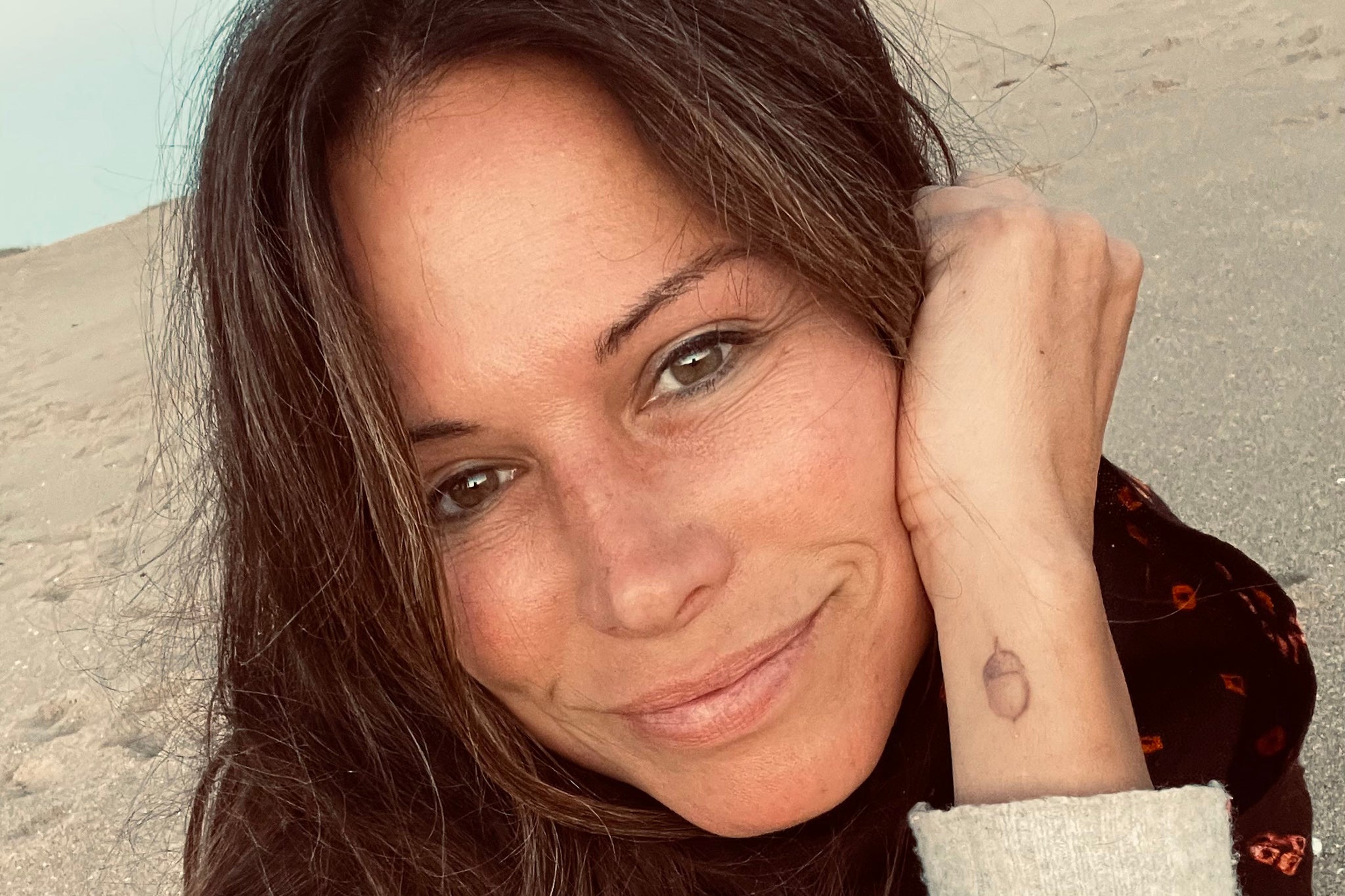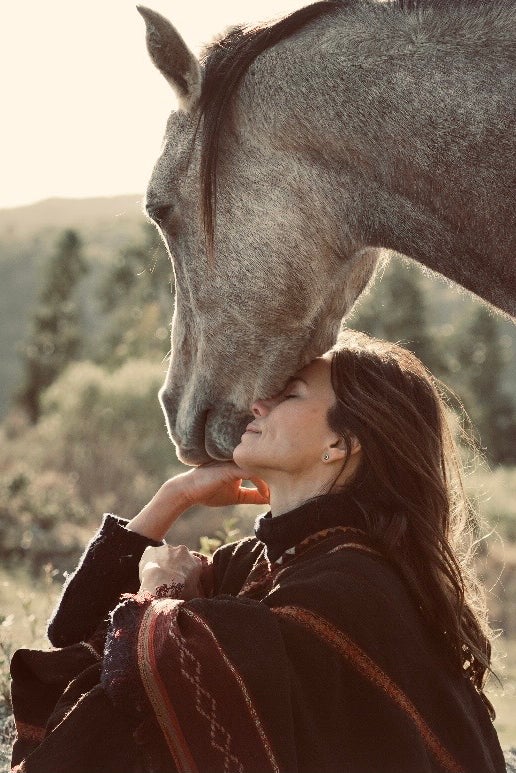
In some ways, if only on the surface, Rhona Mitra led a charmed Hollywood existence. From the late 1990s and into the 2010s, the British actor starred in lots of hit US TV – series such as Boston Legal, The Last Ship and Nip/Tuck – alongside movies like Ali G Indahouse, Sweet Home Alabama and an Underworld sequel. She was typecast, often as English, haughty and dangerous, but she was busy. She made money. She had a house. There are numerous reasons she left it all behind, she tells me. But if she were to sum up why she brought her time in America to a close, it would go a little something like this.
“Los Angeles is a machine that runs on sales,” the 49-year-old explains, with a sonorous, sharply enunciated calm, from her new home in Uruguay. “It’s the stock market. It doesn’t care about conserving souls. It will use, abuse, rape and pillage until it’s done with you, and a lot of people lose themselves to it. It’s multilayered as to how and why I had to leave. But fundamentally, it was to save my soul.”
Today, her world is vastly different. I speak to her over Zoom, Mitra with a mug of tea in hand, the 400 acres of land she presides over in the rugged Uruguayan sierras just out of shot. There she rehabilitates and rewilds horses, many of whom come to her sick, malnourished and traumatised by abuse. It is tough but incredibly rewarding work, funded via donations and occasional acting jobs, which are now typically filmed outside of the US – like the comic-book fantasy movie Red Sonja, which is released this week. “I’ve sort of excommunicated myself,” Mitra says, with a smile. “I feel like I stepped through the closet into Narnia and I’ve been on the other side for nearly a decade now.” Red Sonja is like a tentacle connecting her to another place, she jokes. Or actually, she corrects herself, another life.
As an actor, Mitra has always seemed to carry an invisible force field around her – she is assertive and charismatic on screen, with a presence that commands attention. This, in Hollywood logic at least, tends to mean “a physically strong woman”, and Mitra has unsurprisingly been armed with guns, axes and swords in far more projects than I can reasonably mention here. It’s given her a devoted fanbase in genre circles – Neil Marshall’s ramshackle post-apocalyptic thriller Doomsday is a typical favourite – but she admits to rarely finding it satisfying. “If you want to call it ‘kicking arse’, I can do that in spades,” she says. “But it’s not interesting to me. My life here in Uruguay, in all of its shades, is far more nourishing.”
I wanted to talk to Mitra for this very reason. The history of Hollywood is littered with stories of actors who experience various forms of horror and degradation and don’t make it out alive. Mitra got out. Her Instagram account, and that of her horse sanctuary The Last Ark, is rooted in ideas of compassion, survival and righteous anger. She speaks of healing, the pain of generational trauma and the ongoing genocide in Gaza.
The [Hollywood] system perpetuates narcissistic and supremacist violence, and it preys upon naive, innocent young people who are hungry for a little bit of love and validation
How she got here is worthy of a few biographies in itself. Mitra was born in London to an Irish mother and an Indian father, with acting ultimately providing routine and responsibility as a teenager. She attended drama school for a year, and, in 1996, did the requisite guest spot on The Bill. A year later, at the age of 19, she was cast to be the physical embodiment of Lara Croft, appearing in the video game’s promotional campaigns and on magazine covers – she even wrote and recorded, as Lara, a very good 1998 electronica album produced by the Eurythmics’ Dave Stewart.
“I was a teenager without direction being called in to be a representative of a very strong female, and it gave me a strength within myself,” she remembers. “Then I realised it was being commandeered by people who didn’t have the same care for the character as I did. It doesn’t take a genius to figure out what they did with that character. They objectified her, and they basically violated her, which I felt was a violation of me. There was only so far that I could run with that.” The game developers, she adds, wanted a model, and Mitra was never a model. “They wanted someone to stand on their mark and pose and pout, and I had things to say and things to offer.” So she walked away. The experience proved to be a blueprint for all that would happen to her later: a blissful beginning, a corrupted middle, and an ending in which Mitra has no choice but to save herself.

America offered opportunity. A US agent visiting London asked her to try her hand at acting in LA, and Mitra leapt – partly out of frustration. “I had learnt about the snobbery of the casting industry in England,” she says. “They only deemed me as being a pixelated character, while America understood that I was malleable.” Work came instantly, first on the teen drama Party of Five, then the medical procedural Gideon’s Crossing. The sadly departed Andre Braugher – later of the police comedy Brooklyn Nine-Nine – served as a mentor. Movies followed – among them Alan Parker’s The Life of David Gale, opposite Kate Winslet, and Paul Verhoeven’s Hollow Man. But soon the parts began to rankle.
“I didn’t have the confidence to say no to things. I also didn’t have anybody in my corner who said no for me. And that meant perpetuating roles that very much focused on physicality, or about being British and sassy and powerful and snappy and ‘hot’.” She bristles. “That word kept on coming at me – and there I am, quite an earthy tomboy who likes to spend a lot of her time with animals and in nature. It became very, very uncomfortable and painful after a while.”
She says she was “cursed” at the peak of her acting career to work on repeated projects with “alcoholic, very abusive male leads”, and looked on from afar when the MeToo movement first began to unfold. “I was there, I lived it, and I could write the book on it, but I chose not to be a victim of other people’s behaviour,” she says. “I definitely allowed things to happen to me that I shouldn’t have, that nobody should have allowed to take place. But the system perpetuates narcissistic and supremacist violence, and it preys upon naive, innocent young people who are hungry for a little bit of love and validation.”
A few different experiences led Mitra to Uruguay. First, she fell ill with an autoimmune disorder due to a vaccine injury, and struggled to find doctors who took her ailments seriously. Then, in 2015, due to her surname, she was barred from re-entering the US after a brief period overseas. “Mitra is a Hindu name, and in Iran it is a Muslim name, and that name was on a list,” she says. “So, after 18 years of living in the States and paying taxes and being a resident and having my whole life there, I was denied entrance.”

Around the same time, she had a dream in which she was riding a horse in Patagonia. “And I know how that sounds,” Mitra laughs. “I’m not one of those vision board people, I literally had a bloody dream.” A friend connected her to someone hosting horse races in the region, and Mitra took part in an 80k endurance race on horseback. At the 60k mark, Mitra’s own back gave out. She was in agony. “I couldn’t pull the horse up and stop him galloping,” she remembers. “All I could feel was fire and fury beneath me, so I had to breathe into a much deeper part of my soul and connect with this horse and ask him – with all of my being – to stop for my own safety. He stopped. I got off. I was in the middle of nowhere, surrounded by glaciers. I spoke to him. I asked him whether or not he would get me back to the finishing line. The message I got back from him was, ‘How dare you, with your arrogance, think that you can commandeer my back, abuse and use me and for what? For a prize?’”
Mitra goes quiet. She says she asked the horse how she could make it up to him. He told her that it was for her to determine. Her vow in the moment, she says, was to “create a space where humans come to learn and unlearn our psychopathy and our need to subjugate everything, and relearn our relationship with land and animal”. The horse allowed her to return to his back, and the pair walked to the finish line.
In 2016, Mitra sold her LA home, bought a one-way ticket to Buenos Aires, improved her Spanish, then bought a piece of land in the more economically and politically stable Uruguay. “I knew it had to have running water and that I wanted to have my own vegetable garden and a place that could house horses, plus a little casita for me and my dogs.” She has remained there ever since. “With the mad streak of all of that, and also the betrayal of a country that I had given everything to for 18 years, it was enough fuel to get me down here and build a house and create a sanctuary.” While today she has fostered a small community of other people, for six years she was entirely alone apart from her horses. “They taught me absolutely everything about my own healing,” she says. “They taught me about listening, about humility, about overcoming fear. More and more have come and now I have 35 horses.”
-2.jpeg)
It’s not, though, cheap to sustain. Red Sonja, in which Mitra plays a tough and ever-so-slightly camp warrior woman who offers solace and guidance to Matilda Lutz’s flame-haired hero, came as an offer from an old friend, the director MJ Bassett. She told her it would mean working with a small, lovely group of European crew in Bulgaria, and Mitra was tempted. “It was winter here and I was getting cabin fever,” Mitra recalls, “and – to put it simply – I needed some money to pay for the horse feed.”
She thinks many people have spent the past few years pining for a different life. “I think we’re all realising we’re part of this play within the theatre of life, living these sort of hologram lives,” she says. “All I did was pull out the IV that was connected to that life and that version of my identity, and plugged it into something more nutrient-dense.”
What she shares of her new life, she adds, is meant to inspire, raise awareness and showcase the beauty of the natural world. “It’s not done out of decadence or vanity,” she says, firmly. “It’s about extending the narrative I’ve been shown. Because there is another way of being.”
By now, Mitra’s tea has gone cold and duty calls: it’s lunchtime for her horses.
‘Red Sonja’ is available now on digital platforms, and on DVD and Blu-ray from 8 September
Read more about the work of The Last Ark at its official site
17 weirdly underrated performances by great actors
The most overrated films of the 21st century
Rocky Horror forever: How a tiny US cinema helped turn a flop movie into a phenomenon
30 best characters from Quentin Tarantino films
20 movies that got the casting disastrously wrong
Spike Lee is a living master – so why does no one care about his new film?







